互联网的特性(精)
互联网意思

互联网意思
互联网,简称“网”,是由有线电视网、数字电视网、广播电视网、亚链路、电话网等网络互相连通而成的网际网。
互联网是一个庞大的网络,不依赖任何一种特定的物理链路。
它是连接世界上所有网络的网络,是依靠一种协议让整个网络内容全球互通和展开,它具有广阔的信息资源、发达的技术手段和良好的商业环境。
互联网的操作原理是一种计算机的连结工程,遵循一个编写的服务标准。
这些服务标准包含很多种类的服务,比如电子邮件、网络电话等等。
用户通过一种连接计算机的软件实现连接,连接互联网后,就可以获取到更多的信息。
互联网促进了信息共享和社会的整合。
它有着开放和共享的特性,成为了通信的工具和全球信息库。
现在大多数人可以方便地访问互联网,查找所需要的信息和与世界各地的人交流。
从商业角度看,互联网已经成为了现代社会不可或缺的一部分。
通过互联网,人们可以购买商品、查找资料、娱乐等等,也可以实现远程办公、在线教育、网络会议等。
互联网已经深刻地改变了人们的生活方式和工作方式。
总的来说,互联网已经成为了21世纪一个重要的发展方向和关键工具。
它的影响力越来越大,不仅对人们的生活方式有着深远的影响,同时也在不断地推动着社会的发展和变革。
通过互联网,人们可以快速地获取信息和知识,扩大视野,提高效率,促进交流,实现更智能化、便捷化的服务模式。
网络产品的营销策略
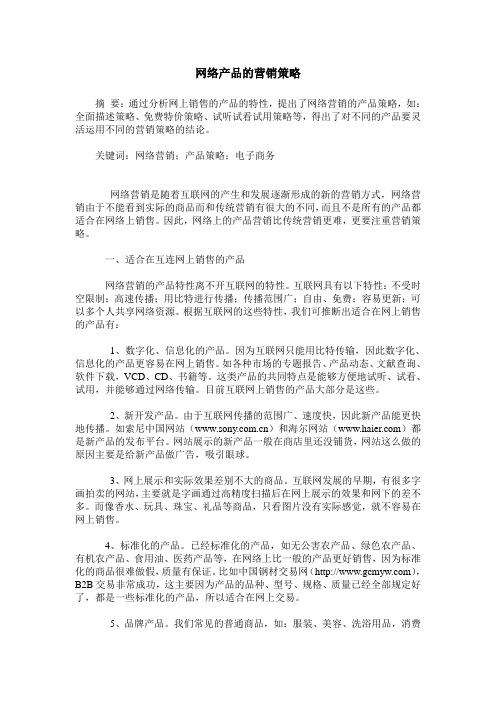
网络产品的营销策略摘要:通过分析网上销售的产品的特性,提出了网络营销的产品策略,如:全面描述策略、免费特价策略、试听试看试用策略等,得出了对不同的产品要灵活运用不同的营销策略的结论。
关键词:网络营销;产品策略;电子商务网络营销是随着互联网的产生和发展逐渐形成的新的营销方式,网络营销由于不能看到实际的商品而和传统营销有很大的不同,而且不是所有的产品都适合在网络上销售。
因此,网络上的产品营销比传统营销更难,更要注重营销策略。
一、适合在互连网上销售的产品网络营销的产品特性离不开互联网的特性。
互联网具有以下特性:不受时空限制;高速传播;用比特进行传播;传播范围广;自由、免费;容易更新;可以多个人共享网络资源。
根据互联网的这些特性,我们可推断出适合在网上销售的产品有:1、数字化、信息化的产品。
因为互联网只能用比特传输,因此数字化、信息化的产品更容易在网上销售。
如各种市场的专题报告、产品动态、文献查询、软件下载,VCD、CD、书籍等。
这类产品的共同特点是能够方便地试听、试看、试用,并能够通过网络传输。
目前互联网上销售的产品大部分是这些。
2、新开发产品。
由于互联网传播的范围广、速度快,因此新产品能更快地传播。
如索尼中国网站()和海尔网站()都是新产品的发布平台。
网站展示的新产品一般在商店里还没铺货,网站这么做的原因主要是给新产品做广告,吸引眼球。
3、网上展示和实际效果差别不大的商品。
互联网发展的早期,有很多字画拍卖的网站,主要就是字画通过高精度扫描后在网上展示的效果和网下的差不多。
而像香水、玩具、珠宝、礼品等商品,只看图片没有实际感觉,就不容易在网上销售。
4、标准化的产品。
已经标准化的产品,如无公害农产品、绿色农产品、有机农产品、食用油、医药产品等,在网络上比一般的产品更好销售,因为标准化的商品很难做假,质量有保证。
比如中国钢材交易网(),B2B交易非常成功,这主要因为产品的品种、型号、规格、质量已经全部规定好了,都是一些标准化的产品,所以适合在网上交易。
web2.0的特点
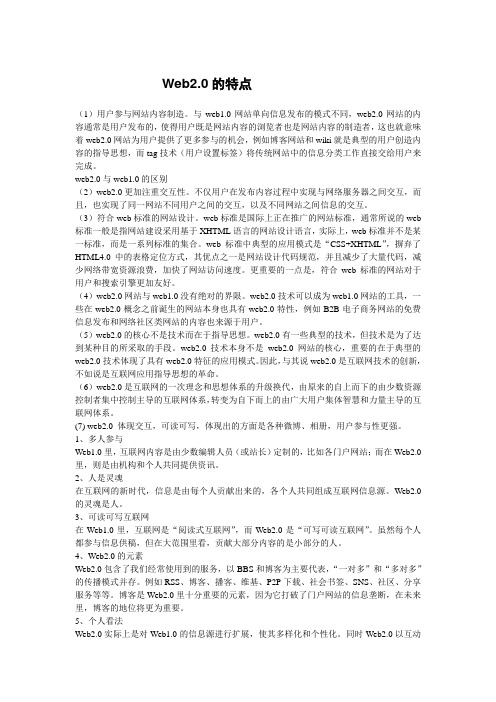
Web2.0的特点(1)用户参与网站内容制造。
与web1.0网站单向信息发布的模式不同,web2.0网站的内容通常是用户发布的,使得用户既是网站内容的浏览者也是网站内容的制造者,这也就意味着web2.0网站为用户提供了更多参与的机会,例如博客网站和wiki就是典型的用户创造内容的指导思想,而tag技术(用户设置标签)将传统网站中的信息分类工作直接交给用户来完成。
web2.0与web1.0的区别(2)web2.0更加注重交互性。
不仅用户在发布内容过程中实现与网络服务器之间交互,而且,也实现了同一网站不同用户之间的交互,以及不同网站之间信息的交互。
(3)符合web标准的网站设计。
web标准是国际上正在推广的网站标准,通常所说的web 标准一般是指网站建设采用基于XHTML语言的网站设计语言,实际上,web标准并不是某一标准,而是一系列标准的集合。
web标准中典型的应用模式是“CSS+XHTML”,摒弃了HTML4.0中的表格定位方式,其优点之一是网站设计代码规范,并且减少了大量代码,减少网络带宽资源浪费,加快了网站访问速度。
更重要的一点是,符合web标准的网站对于用户和搜索引擎更加友好。
(4)web2.0网站与web1.0没有绝对的界限。
web2.0技术可以成为web1.0网站的工具,一些在web2.0概念之前诞生的网站本身也具有web2.0特性,例如B2B电子商务网站的免费信息发布和网络社区类网站的内容也来源于用户。
(5)web2.0的核心不是技术而在于指导思想。
web2.0有一些典型的技术,但技术是为了达到某种目的所采取的手段。
web2.0技术本身不是web2.0网站的核心,重要的在于典型的web2.0技术体现了具有web2.0特征的应用模式。
因此,与其说web2.0是互联网技术的创新,不如说是互联网应用指导思想的革命。
(6)web2.0是互联网的一次理念和思想体系的升级换代,由原来的自上而下的由少数资源控制者集中控制主导的互联网体系,转变为自下而上的由广大用户集体智慧和力量主导的互联网体系。
2020年山东省继续教育公需课随堂试题(含答案)
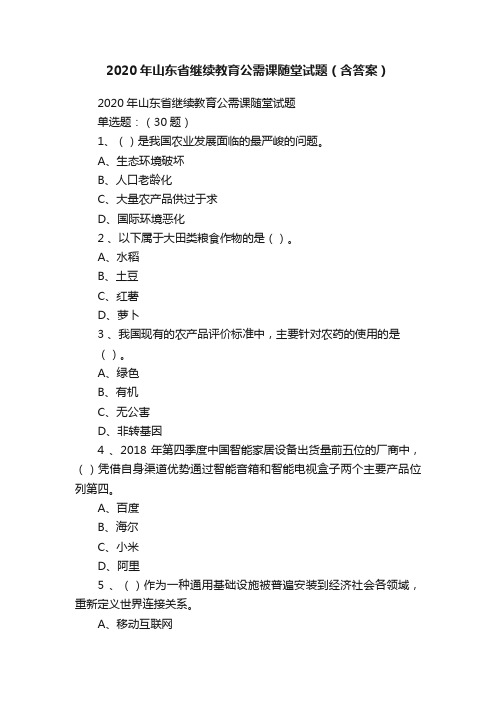
2020年山东省继续教育公需课随堂试题(含答案)2020年山东省继续教育公需课随堂试题单选题:(30题)1、()是我国农业发展面临的最严峻的问题。
A、生态环境破坏B、人口老龄化C、大量农产品供过于求D、国际环境恶化2 、以下属于大田类粮食作物的是()。
A、水稻B、土豆C、红薯D、萝卜3 、我国现有的农产品评价标准中,主要针对农药的使用的是()。
A、绿色B、有机C、无公害D、非转基因4 、2018年第四季度中国智能家居设备出货量前五位的厂商中,()凭借自身渠道优势通过智能音箱和智能电视盒子两个主要产品位列第四。
A、百度B、海尔C、小米D、阿里5 、()作为一种通用基础设施被普遍安装到经济社会各领域,重新定义世界连接关系。
A、移动互联网B、网络通信技术C、云计算技术D、软件和算法6 、英国央行行长2019年8月23日提出()取代美元成为世界储备货币。
A、“合成霸权数字美元”B、“合成霸权数字英镑”C、“合成霸权数字法币”D、“合成霸权数字日元”7 、区块链可以大幅缩短周期,现在贸易金融周期是()天。
A、86B、87C、88D、898、()是核心技术。
A、大数据B、区块链C、人工智能D、云计算9 、农产品最终的味道和结果60%依赖于()。
A、种业B、种植技术C、辅助技术D、土地10 、从美国进口农产品有时比本国市场价格低廉的原因在于()。
A、美国的规模化农业B、美国农产品补贴额度高C、我国跨界型、管理型人才欠缺D、我国种业种植技术的匮乏11 、种业种植的收益远高于农产品生产,但其中的难点不包括()。
A、研究周期长B、跨学科领域C、人员匮乏D、投资额巨大12、()的协议是加密+拜占庭将军。
A、真链B、弱链C、伪链D、类似链13、()的协议是中心化一致性。
A、真链B、弱链C、伪链D、类似链14、()的协议是加密+数据库一致性。
A、真链B、弱链C、伪链D、类似链15、()主要包括工业机器人、数控机床、3D打印设备、智能控制系统等。
青少年网络成瘾现状及其危害

随着信息时代的到来,互联网席卷全球并在改变着人类传统的生产方式、工作方式、生活方式和思维方式。
互联网如一把“双刃剑”,在带来积极影响的同时,也带来了负面影响。
美国广播电视网一项最大规模的调查表明,有6%以上的网络使用者有成瘾症状。
互联网在中国高速发展,据中国互联网络信息中心(CNNIC)2004年1月发布的《第十三次中国互联网络发展状况调查统计报告》,截至2003年底,中国大陆的网民数已达7950万人,在各年龄阶段中,18岁以下占18.8%,18-24岁占34.1%,25-30岁占17.2%(中国互联网络信息中心:《第十三次中国互联网络发展状况调查统计报告(2004年1月)》,)。
年龄结构表明,我国的网民以青少年居多,我国青少年网络成瘾问题正随着互联网的普及而日益突现出来。
为什么会出现网络成瘾现象?如何正确引导和解决青少年网络成瘾问题?围绕上述问题,本论文着重从心理学的角度对青少年网络成瘾问题进行深入的分析,并综合论述了网络本身的特性及个体人格特质这两方面因素对青少年网络成瘾的影响,同时,在此基础上提出了一些具体的应对措施。
一、青少年网络成瘾现状及其危害(一)网络成瘾的定义与症状“网络成瘾综合症”(Internet Addiction Disorder,简称IAD),于1994年由纽约的一位精神医生Goldberg提出,临床上是指由于患者对互联网过度依赖而导致明显的心理异常症状以及伴随的生理性受损的现象。
美国心理学家Kimberly S.Young认为IAD与沉溺赌博、酗酒、吸毒等无异,导致的损害是多方面的:学业成绩下降、损害身体健康、夫妻关系障碍或离异、影响正常工作等(Kimberly S.Young,“INTERNET ADDICTION:THE EMERGENCE OF A NEW CLINICAL DISORDER,”Cyber Psychology and Behavior, Vol.1 No.3, )。
互联网行业网络优化的移动端性能优化
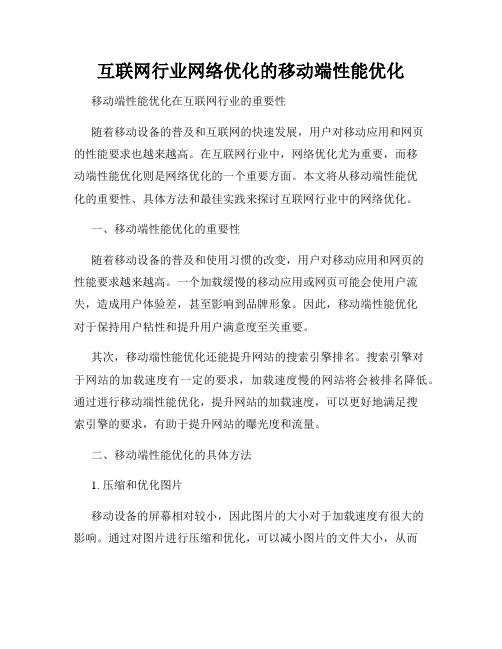
互联网行业网络优化的移动端性能优化移动端性能优化在互联网行业的重要性随着移动设备的普及和互联网的快速发展,用户对移动应用和网页的性能要求也越来越高。
在互联网行业中,网络优化尤为重要,而移动端性能优化则是网络优化的一个重要方面。
本文将从移动端性能优化的重要性、具体方法和最佳实践来探讨互联网行业中的网络优化。
一、移动端性能优化的重要性随着移动设备的普及和使用习惯的改变,用户对移动应用和网页的性能要求越来越高。
一个加载缓慢的移动应用或网页可能会使用户流失,造成用户体验差,甚至影响到品牌形象。
因此,移动端性能优化对于保持用户粘性和提升用户满意度至关重要。
其次,移动端性能优化还能提升网站的搜索引擎排名。
搜索引擎对于网站的加载速度有一定的要求,加载速度慢的网站将会被排名降低。
通过进行移动端性能优化,提升网站的加载速度,可以更好地满足搜索引擎的要求,有助于提升网站的曝光度和流量。
二、移动端性能优化的具体方法1. 压缩和优化图片移动设备的屏幕相对较小,因此图片的大小对于加载速度有很大的影响。
通过对图片进行压缩和优化,可以减小图片的文件大小,从而提升加载速度。
同时,选择适当的图片格式(如WebP格式),也能够减少文件大小,进一步提高加载速度。
2. 精简和压缩代码移动端性能优化的一个重要方面是减少HTTP请求的次数和文件大小。
通过精简和压缩代码,去除无用的字符和空白行,减小代码文件的大小,从而提高加载速度。
此外,合并和压缩CSS和JavaScript文件也是优化性能的有效手段。
3. 利用缓存机制移动端的性能优化还可以通过利用缓存机制提升加载速度。
通过设置适当的缓存策略,可以让一些静态资源(如图片、CSS文件等)在用户再次访问时能够从本地缓存读取,减少对服务器的请求,提高加载速度。
4. 使用响应式设计响应式设计是一种能够适应不同设备和屏幕尺寸的设计方法。
通过使用响应式设计,可以根据不同设备的特性和网络状况,动态地调整页面布局和加载内容,以提供更好的用户体验。
移动互联网技术论文

移动互联网技术论文Last revision on 21 December 2020论文题目:姓名:朱强专业:2013级物联网工程班级:1班学号:联系电话:摘要,的分析师团队结合科学发展的理论认为,是指互联网的技术、平台、商业模式和应用与结合并实践的活动的总称。
和互联网成为当今世界发展最快、市场潜力最大、前景最诱人的两大业务,它们的增长速度都是任何预测家未曾预料到的,所以移动互联网可以预见将会创造经济神话。
移动互联网的优势发展与趋势决定其用户数量庞大,截至2012年9月底,全球移动互联网用户已达15亿。
关键字:移动互联网;移动通信;发展趋势目录一、移动互联网的定义移动互联网是移动和互联网融合的产物,继承了移动随时随地随身和互联网分享、开放、互动的优势,是整合二者优势的“升级版本”,即运营商提供无线接入,互联网企业提供各种成熟的应用。
移动互联网被称为下一代互联网。
比如dropbox,uDrop这类应用就是典型的移动互联网应用。
移动互联网业务和应用包括移动环境下的网页浏览、文件下载、位置服务、在线游戏、视频浏览和下载等业务。
随着宽带无线移动通信技术的进一步发展,移动互联网业务的发展将成为继宽带技术后互联网发展的又一个推动力,为互联网的发展提供一个新的平台,使得互联网更加普及。
并以移动应用固有的随身性、可鉴权、可身份识别等独特优势,为传统的互联网类业务提供了新的发展空间和可持续发展的新商业模式;同时,移动互联网业务的发展为移动网带来了无尽的应用空间,促进了移动网络宽带化的深入发展。
移动互联网业务正在成长为移动运营商业务发展的战略重点。
二、移动互联网的特点“小巧轻便”及“通讯便捷”两个特点,决定了移动互联网与PC互联网的根本不同之处,发展趋势及相关联之处。
可以“随时、随地、随心”地享受互联网业务带来的便捷,还表现在更丰富的业务种类、个性化的服务和更高服务质量的保证,当然,移动互联网在网络和终端方面也受到了一定的限制。
2020年淄博继续教育公需课视频中的题76661
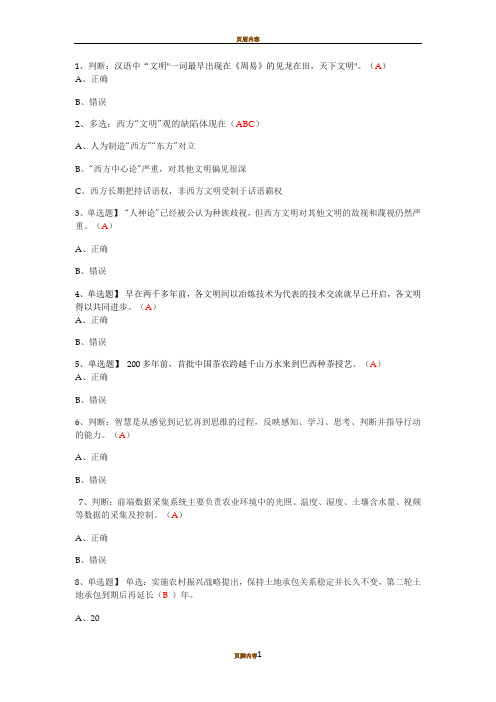
1、判断:汉语中“文明"一词最早出现在《周易》的见龙在田,天下文明"。
(A)A、正确B、错误2、多选:西方“文明”观的缺陷体现在(ABC)A、人为制造“西方”“东方”对立B、“西方中心论”严重,对其他文明偏见很深C、西方长期把持话语权,非西方文明受制于话语霸权3、单选题】“人种论”已经被公认为种族歧视,但西方文明对其他文明的敌视和蔑视仍然严重。
(A)A、正确B、错误4、单选题】早在两千多年前,各文明间以冶炼技术为代表的技术交流就早已开启,各文明得以共同进步。
(A)A、正确B、错误5、单选题】200多年前,首批中国茶农跨越千山万水来到巴西种茶授艺。
(A)A、正确B、错误6、判断:智慧是从感觉到记忆再到思维的过程,反映感知、学习、思考、判断并指导行动的能力。
(A)A、正确B、错误7、判断:前端数据采集系统主要负责农业环境中的光照、温度、湿度、土壤含水量、视频等数据的采集及控制。
(A)A、正确B、错误8、单选题】单选:实施农村振兴战略提出,保持土地承包关系稳定并长久不变,第二轮土地承包到期后再延长(B)年。
A、20B、30C、40D、509、多选题:实施乡村振兴战略,坚持农业农村优先发展,按照()的要求建立健全城乡融合发展体制机制和政策体系。
(ABCDE)A、产业兴旺B、生态宜居C、乡风文明D、治理有效E、生活富裕10、判断:用“生产发展”代替“产业兴旺”,更加突出了农村产业的综合发展,而非单纯的农业发展。
(B)A、正确B、错误11、判断:推进体制机制创新,强化乡村振兴的制度供给,也是走中国特色乡村振兴道路的重点之一。
(A)A、正确B、错误12、多选题:根据本讲,走乡村振兴道路的难点包括(ABC)。
A、打好精准脱贫攻坚战,增强贫困群众获得感B、汇聚全社会力量,强化乡村振兴人才支撑C、开拓投融资渠道,强化乡村振兴投入保障D、推进体制机制创新,强化乡村振兴的制度性供给13、以前中国区块链发展面临的环境是危险的、失控的?(A)A、正确14互联网的特性是(A)A、全球性B、智慧性C、一体性D、以上都对、15、多选:美国的整体布局是以(ABC)为内容的新型宏观经济学、新秩序。
互联网的简称和全称

互联网的简称和全称互联网是当今世界最重要的信息和通信技术之一,已经深刻影响了人们的生活和社会发展。
它的中文简称是“网”,而全称则是“互联网”,下面将对互联网的简称和全称进行详细解析。
一、互联网的简称——“网”互联网的简称通常是“网”,这是因为互联网是由许多计算机网络互相连接而成的。
在计算机图示中,计算机网络通常用网线或网状线条来表示。
因此,人们习惯将互联网简称为“网”,这一简洁的称呼很好地概括了互联网的特点。
二、互联网的全称——“互联网”互联网的全称是“互联网”,这个名称意味着互联网是由不同的计算机网络互相连接而成的广阔网络系统。
全称中的“互联”指的是互相连接的意思,而“网”则表示网络。
这个全称准确地描述了互联网的结构和功能。
三、互联网的其他叫法除了简称和全称之外,互联网还有一些其他常见的叫法,比如“网络”、“网际网络”、“国际网络”等。
这些叫法在某种程度上都能够反映出互联网的特性和作用。
网络是比较常用的一个叫法,它强调了互联网是一种连接着不同计算机之间的网络系统。
这个词在中文中较为常见,人们通常用来形容互联网的整体结构和功能。
网际网络(InterNetwork)是另一个常见的叫法,它强调了互联网是由各种不同的网络互相连接而成的。
这个术语在英文中常称为“Internet”,被广泛应用于全球范围内。
国际网络是一个有地域性的叫法,它强调了互联网不仅仅是一个国家或地区范围内的网络系统,而是连接了全球各个国家和地区的网络系统。
这个叫法强调了互联网的全球性质。
综上所述,互联网的简称是“网”,全称是“互联网”。
这两个名称准确地揭示了互联网的特性和功能。
此外,还有一些其他常见的叫法,比如“网络”、“网际网络”、“国际网络”等,它们也能够在一定程度上反映出互联网的特点和作用。
互联网的出现和发展极大地改变了人们的生活方式和社会结构,提供了丰富的信息资源和无限的交流机会。
作为全球化时代的重要基础设施,互联网的发展将继续推动科技和社会的进步,为我们的未来带来更多美好的可能性。
论互联网行业招聘的特点

论互联网行业招聘的特点作者:老白作为互联网行业做的比较久(且只做过互联网行业)的招聘人员,老白经常跟各行各业的招聘领袖有些沟通,时常也有机会跟互联网行业的真正领袖们聊天,这种时候经常会想到或被问到一个问题:互联网行业的招聘和传统行业的招聘有什么区别?关于这个问题江湖上众说纷纭,基本上,都是屁股决定脑袋。
我也就只在我自己,一个招聘实践者的角度上说说感受吧。
从工作KPI的角度来说,行业的区别不大。
招聘要做到的几个目标:1、网罗人才,提供给公司筛选2、达成招聘数量,满足公司需求3、传播雇主品牌,提升公司的雇主美誉度4、搜集信息,帮助公司调整人力资源和和业务战略方向任何行业的公司都是需要的,并不是只有互联网公司才有。
那么互联网行业的特性是如何影响招聘工作的呢,我粗略总结一下:1、互联网市场格局变化快、创业门槛低、还有越洋人才抢夺,因此优秀的产品和技术人才平均薪资很高,薪资结构与传统行业甚至传统IT行业有很大不同。
互联网行业是一个经常会出现颠覆性创新的行业。
互联网信息的流动速度越来越快,每个细分领域的生命周期,从初创到稳定到被取代用的时间会越来越短,反应够快是非常重要的门槛。
同时每个细分市场一般是一家独大或者最多有两三家独大,反应慢的或没有垄断资源的重复性产品基本没有活路。
因此,能捕捉到最新的用户需求的产品人员、能力强大——能快速把产品需求实现以及能以技术创新颠覆现有实现方式——的技术人员、甚至包括本身能力并不突出但是掌握了某些新技术的人员(比如00年的web开发,06年的搜索相关技术,12年的移动端开发技术),就会变得非常抢手。
同时,互联网行业企业面临的人才竞争不仅是来自同等公司,还越来越来自天使投资人、传统行业和硅谷公司。
移动互联网、TMT的概念,极大地激活了天使投资这个几年前对国人来说还挺陌生的领域。
老白认识的天使投资人以及在各种投资机构工作的,熟悉不熟悉的加起来,没有上千也有几百。
“投资的收益率高于自己创业”,Taleb的这个结论和现实中的各种光辉榜样,让无数有闲钱的人加入了天使投资的大军,但是天使必须伴随着项目,项目就伴随着人才,投资人忽悠的功力那绝对不会逊色于企业的招聘顾问。
能源互联网的特点介绍

能源互联网的特点介绍谈到能源互联网,很多研究人员都会将其与现有的一些能源网络(如智能电网、微网、泛能网等能源网络)进行对比,分析其中存在的异同点,进而得出能源互联网的特点。
本文将首先列举能源互联网与当前主要能源网络的区别,在此基础上,得出能源互联网的特性。
一、能源互联网与智能电网的区别智能电网就是电网的智能化(智电电力),也被称为“电网2.0”,它是建立在集成的、高速双向通信网络的基础上,通过先进的传感、测量、控制方法以及决策支持技术的应用,实现电网的可靠、安全、经济、高效、环境友好和使用安全的目标,其主要特征包括能够提供满足21世纪用户需求的电能质量、容许各种不同发电形式的接入、启动电力市场以及资产的优化高效运行,其与能源互联网的区别主要体现在以下方面:1、接入能源类型不同智能电网以电能为主,能源互联网包括电、气、热等多种类型能源。
但是,这不能简单地认为多种能源接入了就是能源互联网,一定要有针对多种能源的统一度量、统一建模和统一优化与调度。
2、接入方式不同智能电网尽管强调了分布式发电在其中起到的作用,但是,从本质上,无论是调度模式,还是控制策略,都还是集中的垂直调控思想,即通过一个调控中心来进行统一的控制,任何能源提供设备的接入必须在上一级调控中心进行报备,并归入集中控制,而能源互联网采用的是分布式对等接入,各个能源提供设备可以实现即插即用。
3、信息利用模式不同智能电网相对于传统电网的采集点和采集信息更多、更全面,但是对于信息的利用与传统的调度自动化并没有本质区别,信息与物理系统还是独立的,没有有机结合。
能源互联网更为强调物理与信息系统的统一建模,特别是考虑了信息系统对于物理系统的影响。
二、能源互联网与微网微网是相对于传统大电网的一个概念,是指多个分布式电源及其相关负载按照一定的拓扑结构组成的网络,并通过静态开关关联至常规电网,是一个能够实现自我控制、保护和管理的自治系统,既可以与外部电网并网运行,也可以孤立运行,其与能源互联网的区别主要体现在以下方面:1、功能定位不同微网本质上来说是主电网的补充环节,将小范围内的分布式电源、储能和用户通过组网结合起来,提高区域内供电的可靠性,减少对于主电网的扰动,其与传统电网是主从关系;能源互联网连接了多种类型能源网络,实现网络内的能源终端的自主接入,实现的是多种类型能源网络的综合能源优化,与传统电网是并列的关系。
完善工业互联网数据确权与交易机制
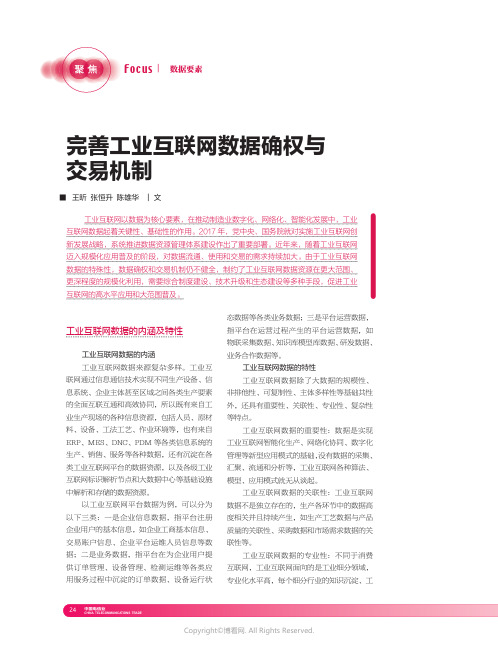
工业互联网数据的内涵及特性工业互联网数据的内涵工业互联网数据来源复杂多样。
工业互联网通过信息通信技术实现不同生产设备、信息系统、企业主体甚至区域之间各类生产要素的全面互联互通和高效协同,所以既有来自工业生产现场的各种信息资源,包括人员、原材料、设备、工法工艺、作业环境等,也有来自ERP、MES、DNC、PDM 等各类信息系统的生产、销售、服务等各种数据,还有沉淀在各类工业互联网平台的数据资源,以及各级工业互联网标识解析节点和大数据中心等基础设施中解析和存储的数据资源。
以工业互联网平台数据为例,可以分为以下三类:一是企业信息数据,指平台注册企业用户的基本信息,如企业工商基本信息、交易账户信息、企业平台运维人员信息等数据;二是业务数据,指平台在为企业用户提供订单管理、设备管理、检测运维等各类应用服务过程中沉淀的订单数据、设备运行状态数据等各类业务数据;三是平台运营数据,指平台在运营过程产生的平台运营数据,如物联采集数据、知识库模型库数据、研发数据、业务合作数据等。
工业互联网数据的特性工业互联网数据除了大数据的规模性、非排他性、可复制性、主体多样性等基础共性外,还具有重要性、关联性、专业性、复杂性等特点。
工业互联网数据的重要性:数据是实现工业互联网智能化生产、网络化协同、数字化管理等新型应用模式的基础,没有数据的采集、汇聚、流通和分析等,工业互联网各种算法、模型、应用模式就无从谈起。
工业互联网数据的关联性:工业互联网数据不是独立存在的,生产各环节中的数据高度相关并且持续产生,如生产工艺数据与产品质量的关联性、采购数据和市场需求数据的关联性等。
工业互联网数据的专业性:不同于消费互联网,工业互联网面向的是工业细分领域,专业化水平高,每个细分行业的知识沉淀、工完善工业互联网数据确权与交易机制■ 王昕 张恒升 陈雄华 ︱ 文工业互联网以数据为核心要素,在推动制造业数字化、网络化、智能化发展中,工业互联网数据起着关键性、基础性的作用。
互联网平台经济的特点与运营模式

互联网平台经济的特点与运营模式互联网平台经济是近年来迅速发展起来的一种经济形态,它以互联网技术为基础,通过建立和运营平台,连接供需双方,促成交易和价值创造。
本文将探讨互联网平台经济的特点和常见的运营模式。
一、互联网平台经济的特点1.1 强大的规模效应互联网平台经济具有强大的规模效应。
随着平台用户数量的增加,平台上的交易活动和数据流量也会迅速扩大,通过平台可以实现成本的快速下降和效率的快速提升。
1.2 多边市场的特性互联网平台经济是一个多边市场,它链接了供应方和需求方。
平台上的供应方提供产品或服务,而需求方在平台上寻找满足自身需求的产品或服务。
平台通过有效的撮合机制,促成供需双方的交易。
1.3 数据驱动的商业模式互联网平台经济是数据驱动的商业模式。
平台通过收集、分析和运用海量的数据,不断优化自身的服务和用户体验。
通过对用户的行为、偏好和需求进行深度分析,平台可以提供个性化的推荐和定制化的服务。
1.4 开放性与创新性互联网平台经济具有开放性和创新性。
平台通过开放的接口和生态系统,吸引和集聚了大量的开发者和合作伙伴。
这些合作伙伴可以基于平台的基础设施和资源,开发出各种创新的应用和服务,为平台带来新的价值和增长点。
二、互联网平台经济的运营模式2.1 C2C模式C2C模式是指个人与个人之间的交易模式。
互联网平台提供了一个在线的市场,个人可以在平台上发布自己的产品或服务,其他个人可以通过平台购买这些产品或服务。
著名的C2C平台如淘宝、闲鱼等。
2.2 B2C模式B2C模式是指企业与个人之间的交易模式。
互联网平台提供了一个在线的商城,企业可以在平台上销售自己的产品或服务,个人可以通过平台购买这些产品或服务。
著名的B2C平台如京东、天猫等。
2.3 O2O模式O2O模式是指线上与线下结合的交易模式。
互联网平台通过线上推广和引流,将用户引导到线下的实体店铺进行消费。
同时,通过线下的消费数据回流到线上平台,实现线上线下的闭环。
网络广告文案有哪些特征
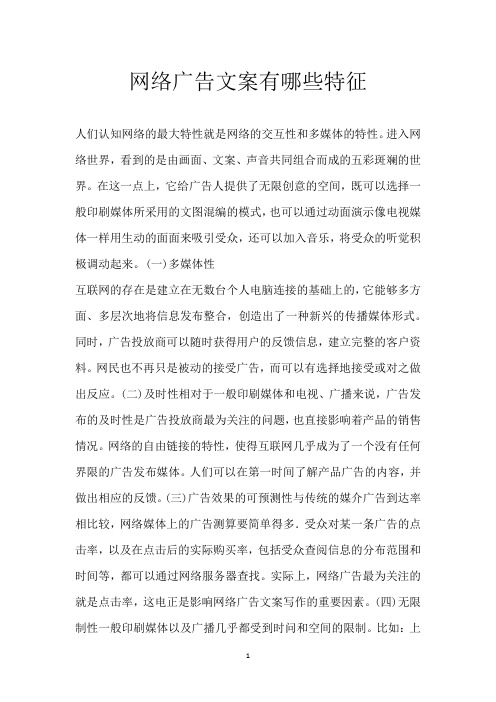
网络广告文案有哪些特征人们认知网络的最大特性就是网络的交互性和多媒体的特性。
进入网络世界,看到的是由画面、文案、声音共同组合而成的五彩斑斓的世界。
在这一点上,它给广告人提供了无限创意的空间,既可以选择一般印刷媒体所采用的文图混编的模式,也可以通过动面演示像电视媒体一样用生动的面面来吸引受众,还可以加入音乐,将受众的听觉积极调动起来。
(一)多媒体性互联网的存在是建立在无数台个人电脑连接的基础上的,它能够多方面、多层次地将信息发布整合,创造出了一种新兴的传播媒体形式。
同时,广告投放商可以随时获得用户的反馈信息,建立完整的客户资料。
网民也不再只是被动的接受广告,而可以有选择地接受或对之做出反应。
(二)及时性相对于一般印刷媒体和电视、广播来说,广告发布的及时性是广告投放商最为关注的问题,也直接影响着产品的销售情况。
网络的自由链接的特性,使得互联网几乎成为了一个没有任何界限的广告发布媒体。
人们可以在第一时间了解产品广告的内容,并做出相应的反馈。
(三)广告效果的可预测性与传统的媒介广告到达率相比较,网络媒体上的广告测算要简单得多.受众对某一条广告的点击率,以及在点击后的实际购买率,包括受众查阅信息的分布范围和时间等,都可以通过网络服务器查找。
实际上,网络广告最为关注的就是点击率,这电正是影响网络广告文案写作的重要因素。
(四)无限制性一般印刷媒体以及广播几乎都受到时问和空间的限制。
比如:上海的读者不能看到北京晚报的报纸广告;电视广告不能在一天24小时都不停地播放。
而在网络上,这些都不成为问题,无论何时何地,打开相同的网页,网络广告都能在受众面前及时出现。
在互联网上,我们不没有与用户面对面交流,靠的就是我们的网站,一个网站什么能够吸引住用户,那肯定就需要靠好的文案。
所以这点也同样重要,网络营销,每个环节都是缺一不可,相辅相成;网络营销需要走进用户的心里,这样你才能打动用户。
《网络与新媒体 编辑运营实务》詹新慧著 第一章读书笔记

第一章:认识网络与新媒体的编辑与运营目的:认识网络与新媒体的技术特征与传播特征,认识网络与新媒体的编辑的内涵、外延及其价值、作用,认识网络与新媒体运营的发展演变与功能影响。
结合案例来理解网络与新媒体结合的必要性和重要性。
第一节:认识网络与新媒体目的:认识其概念,“网络与新媒体”是指两种概念,还是融合在一起?一、关于网络网络:是指由节点和连线构成,使各类孤立的机器或个体相互关联,可传输、接收并共享的一种系统样态。
计算机网络:用通信线路和通信设备将分布在不同地点的多台计算机连接在一起,按照共同的网络协议,实现互联互通、软硬件资源共享的系统。
网络是一种构架,也是一个系统。
要想构建一个网络,需要无数个节点以及运行于系统中的各种应用。
今天的互联网络似乎是一个筐,什么都能往里装。
因此,新媒体只是这个筐里的一个产品。
二:关于新媒体新媒体是一个相对的概念,是在报刊、广播、电视等传统媒介以后发展起来的新的媒介形态。
人们对“新媒体”没有一个清晰的界定。
美国《连线》杂志对新媒体的定义:“所有人对所有人的传播”联合国教科文组织对新媒体的定义:“以数字技术为基础,以网络为载体进行信息传播的媒介”关于新媒体一个共识是其有两个显著的特征:其一是技术的特征,其二是技术的属性,无论是网站、客户端还是其他应用,必须具备媒介的功能、价值、传播链和传播效果等。
三、关于网络新媒体:对于网络与新媒体两方面的认识:第一:网络是基础设施,新媒体是建立在基础设施之上的一类应用。
第二:网络被认为是基于有线网络的,pc计算机为终端的web 网上的各类网站及社交媒体,新媒体被认为是基于移动网络、以手机或iPad为终端的wap网及各类运用。
总之,对于网络与新媒体的认识要用动态的思维。
四、网络新媒体的传播特征(一)互联网的技术特性第一:开放性,系统开放、传播开放、用户开放第二:数字化,在服务器可以无限量增加的前提下,所有内容压缩为数字或数据后,就能无限存储。
网页的版面语言及其特点
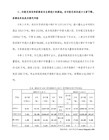
2、形式上对传统排版方式的冲击
传统媒体由于受版面或时间的限制,往往尽量对内容进行最合理编排,其手段就是通过对标题、版位(时间段)、色彩等项目的技术处理,人为突出或减弱某些部分的强势。
而网络媒体由于版面丰富,加上其自身的传播特色,在版面编排形式上具有一些新的特征。比如“多”意味着“选择性强”、“丰富”,但在某种程度上也意味着“杂”,如何让读者在海量信息中便捷地得到其欲知的信息便成为问题的关键。这时网站的主页便承担了一个独特的角色。从外形上看,主页与报纸的头版有些相似,但无疑主页对网站内容具有更大、更清晰的概括性;与广播电视的节目预告也有类似之处,但主页在时间上可与其下级网页并存。如何最好地发挥网络的“超链接”功能和主页的“目录”作用,是各网络媒体一直在探讨的一个问题。研究表明,网络读者对于信息的获知兴趣,受到对该信息的搜索过程的明显影响,如果达到某一信息的过程稍嫌繁琐(比如链接超过了若干次、信息分类不当等),读者就极有可能中途放弃。
3、冲击带来的后果
虽然目前在业务上网络媒体对传统媒体尚未形成实质性的冲击,但这种新型媒体已经显露出的蓬勃生机以及版面资源的无限性,则在象征意义的层面上,对传统媒体的编排观念产生了强有力的震撼。冲击的结果,除以上提到的一些方面外,最明显的就是部分传统媒体纷纷自觉或不自觉地扩版、增加栏目,试图也能够像网站那样“包罗万象”,比如CCTV改版后的《东方时空》。总体而言,目前传统媒体普遍出现扩版、增加频道、栏目的倾向。这样一方面有助于提高传播内容的细分程度和针对性,另一方面,又造成了这些传统媒体版面的不断膨胀,甚至可能导致编排工作的粗糙化和随意化。
另外,传统媒体由于版面(栏目或频道)有限,在广告版面(时段)上往往也显得灵活性不足,大部分广告与其所在版面或栏目内容并无明显联系,“插”广告的现象十分普遍。相对而言,网站由于版面丰富,加上网络技术方面的特性,广告可以很便利地与相关板块链接起来,比如将体育用品的广告放在体育板块中,将图书广告放在读书板块中。这样无疑使网络媒体的广告显得更具针对性和有序性。
互联网的六大特征是什么

互联网的六大特征是什么互联网是当代社会的重要组成部分,它给我们的生活带来了许多便利和机遇。
正因为如此,我们有必要了解互联网的六大特征,以便更好地适应和利用它。
本文将详细介绍互联网的六大特征。
1. 全球性(Globalization)互联网的第一个特征是全球性。
互联网打破了地理的限制,让世界各个角落都能够连接在一起。
无论你身处何地,只要有互联网的支持,我们可以与世界各地的人进行实时的通信和交流。
这使得信息传播迅速,并提供了无限的合作和交流机会。
2. 开放性(Openness)互联网的第二个特征是开放性。
互联网为所有人提供了相同的平台,任何人都可以在上面发布内容、分享知识和观点。
人们可以自由地表达自己的想法和意见,享受到其他人的观点和经验。
这种开放性促进了创新和合作,使得互联网成为了一个广阔的知识库。
3. 平等性(Equality)互联网的第三个特征是平等性。
在互联网上,每个人都有平等的机会获取信息和资源。
无论你的身份、地位或财富,互联网都能为你提供平等的机会。
这种平等性推动了社会发展的公正性和包容性。
在互联网时代,每个人都可以成为信息的创造者和传播者。
4. 移动性(Mobility)互联网的第四个特征是移动性。
随着智能手机和移动互联网的普及,我们可以随时随地访问互联网。
无论是在家里、办公室还是旅途中,我们都可以通过手机、平板电脑等移动设备与互联网连接。
这种移动性使得我们的生活更加便捷和灵活,拓宽了互联网的应用范围。
5. 多样性(Diversity)互联网的第五个特征是多样性。
互联网上存在着各种各样的内容和服务,涵盖了几乎所有领域。
无论是新闻、教育、娱乐、商业还是社交,互联网都能提供多样化的选择。
人们可以根据自己的兴趣和需求自由选择内容,获得个性化的体验。
6. 安全性(Security)互联网的最后一个特征是安全性。
随着互联网的发展,网络安全问题也日益突出。
因此,保障互联网的安全至关重要。
我们需要采取一系列的措施,包括信息加密、身份验证、漏洞修复等,以保护个人和组织的信息安全,防止网络犯罪和数据泄露。
(完整)网络营销的十个主要特点

(完整)网络营销的十个主要特点网络营销是当今商业领域中最重要的战略之一。
随着互联网的快速发展,越来越多的企业意识到网络营销的重要性,纷纷将其作为提升业务的有效手段。
网络营销的成功离不开其独特的特点,本文将介绍网络营销的十个主要特点。
特点一:广泛覆盖面网络营销具有广泛的覆盖面,可以迅速将信息传播给全球各地的潜在客户。
通过互联网,企业可以将产品或服务的信息传达给更多的消费者,扩大市场的范围。
特点二:立即反馈网络营销可以迅速获得消费者的反馈。
通过在线调查、讨论区和社交媒体等渠道,企业可以实时了解消费者对产品或服务的评价和反馈,从而及时调整营销策略。
特点三:高效低成本相比传统的营销方式,网络营销具有更高的效率和更低的成本。
通过电子邮件、广告投放和社交媒体等渠道,企业可以以较低的成本来开展广告宣传和促销活动,提高市场推广效果。
特点四:个性化定制网络营销可以根据消费者的个性化需求进行定制,提供更加精准的产品或服务推荐。
通过用户数据分析和购买记录等信息,企业可以为每个消费者提供最适合他们的推荐内容,提高购买转化率。
特点五:交互性强网络营销具有很强的交互性,消费者可以随时随地与企业进行互动。
通过在线客服、社交媒体和网络论坛等渠道,企业可以与消费者建立更加紧密的联系,增强用户黏性。
特点六:精确测量网络营销可以通过各种数据分析工具对营销效果进行精确测量。
通过网站流量统计、广告点击率和转化率等指标,企业可以了解不同营销渠道的效果,从而进行优化和调整。
特点七:灵活性强与传统的广告宣传方式相比,网络营销更加灵活多样。
企业可以通过调整广告内容、投放时间和渠道等方式进行灵活的营销策略部署,以应对市场需求的变化。
特点八:社交化推广社交媒体的流行使得网络营销更加社交化。
通过在社交媒体平台上分享和宣传产品或服务,企业可以利用用户的口碑传播效应,扩大品牌知名度和影响力。
特点九:全天候营销互联网的全天候特性使得网络营销可以随时进行。
无论是日间还是夜间,无论在哪个时区,企业都可以通过在线渠道不间断地开展广告宣传和促销活动,满足不同消费者的需求。
网络营销的特点及策略

网络营销的特点及策略网络营销是一种利用互联网平台进行营销活动的方式,具有许多独特的特点和策略。
下面将介绍网络营销的特点以及常用的策略。
网络营销的特点:1. 广泛覆盖面:互联网的普及使得网络营销可以触达全球范围的目标受众,相比传统营销方式,其受众面更为广泛。
2. 低成本高效率:相对于传统营销手段,网络营销成本较低,而且可操作性强,可以根据市场反馈实时调整策略,提高营销的效果与效率。
3. 个性化和定制化:通过互联网平台,可以准确了解和分析目标用户的需求,从而进行个性化和定制化的营销而不需要面对面接触。
4. 信息传播速度快:互联网的特性使得信息在网络上迅速传播,营销信息可以在短时间内覆盖广大用户群体。
5. 交互性强:网络营销可以与用户进行双向沟通和互动,可以通过用户反馈进行改进和调整。
网络营销的策略:1. 建立专业网站:一个简洁、易用、充满内容的专业网站是网络营销的基础。
网站应具备吸引用户、提供有用信息和巩固品牌形象的功能。
2. 社交媒体营销:通过建立和维护社交媒体账号,与用户进行互动和交流,增强用户黏性。
使用社交媒体平台进行宣传、推广和营销活动。
3. 内容营销:通过发布有关产品或服务的高质量内容,吸引目标受众的兴趣和关注。
内容可以包括文章、博客、新闻稿、视频等形式,以提供有价值的信息和吸引流量。
4. 搜索引擎优化(SEO):通过优化网站内容、页面结构和关键词选择,提升网站在搜索引擎中的排名,增加有机流量。
5. 电子邮件营销:通过发送电子邮件,向用户提供有价值的内容和促销信息,增加用户对产品或服务的认知和兴趣。
6. 跨界合作营销:与其他品牌或企业进行合作,通过共同活动、联合推广、互换资源等方式,扩大营销规模和影响力。
7. 数据分析与改进:通过监测和分析网络营销活动的数据,包括流量、转化率、用户反馈等,及时调整和改进营销策略,使其更符合用户需求和市场趋势。
通过充分利用互联网平台的特点和采用相应的策略,网络营销可以有效提升品牌知名度、推广产品和服务,并与目标用户建立良好的互动与合作关系,实现营销目标。
- 1、下载文档前请自行甄别文档内容的完整性,平台不提供额外的编辑、内容补充、找答案等附加服务。
- 2、"仅部分预览"的文档,不可在线预览部分如存在完整性等问题,可反馈申请退款(可完整预览的文档不适用该条件!)。
- 3、如文档侵犯您的权益,请联系客服反馈,我们会尽快为您处理(人工客服工作时间:9:00-18:30)。
Origin of the Internet
1969: The US Department of Defense’s Advanced
Research Project Agency created ARPAnet, first national packet-switched computer network
cheap, efficient and fast method of transmission
How does the Internet operate? (continued)
circuit-switching
any call between two points on the network requires a complete, dedicated connection
How does the Internet operate?
The Internet is the combined result of several technological development:
digitalisation packet-switching Internet address protocols
network
…has a decentralised nature …international in scope (global in scale) ...a many-to-many mass medium …allows interactivity ...substitutable for all existing media? ...offers limitless possibilities?
Downsides of online civic engagement
Risk of political control (direct contact without public scrutiny)
Vague objectives Bogus democracy (online voting) Lack of informed input The risk of fragmentary marginalisation
The Internet - what kind of medium?
a many-to-many mass medium
users …also generate much of the content regulatory issues:
more akin to print or broadcast media? serves as publisher, distributor, broadcaster or
the Internet,
to underpin ‘democracy online’ with infrastructural support, and
create a Civic Commons in Cyberspace.
Benefits of online civic engagement
Topic 1
The Internet – development and special features
What is the Internet?
a vast global interconnection of computer networks around the world
all of which use a common set of technical protocols (Internet Protocols/IP) in routing data across those networks
Origin of the Internet (continued)
1983: the Internet was born officially when ARPAnet
divided into military and civilian components, with the civilian component giving rise to the Internet (開始在 大學供非軍事用)
Transcending time Transcending place Language of the people Making connections Recruitment of experience and expertise Learning to deliberate Community building
The Internet - a democratic medium? (continued)
Regulatory issues
government regulation lead to censorship
and other undesirable effects?
Development left to big corporations...
內容規管
Attempts to regulate content
近期爭議
In response to Web 2.0
嚴管內容? 保證平台開放?
The Internet
As a business tool
As a communicatioቤተ መጻሕፍቲ ባይዱ tool/ As a mass medium
Focus and theme of this course
But these organisations are based in the US (dominated by the US?)
Special features of the Internet
...a fluid, complex entity … a dynamic routed, packet-switched
no one institution or individual owns the Internet, and no one specifically controls
it
the first truly democratic medium of communication in human history?
互聯網 – 導致無政府狀況?
The Internet - leading to anarchy?
Internationalism of the Internet
use and exploration...wholly indifferent to international boundaries (無視國界)
How does the Internet operate? (continued)
Packet-switching vs. circuit-switching Packet-switching
enables digital data... transmitted as discrete packets … over any available route in the network...reassembled at ...IP address
largely unregulated and uncontrolled by the State
a potential to diminish the authority of
government and even becomes a power tool for political subversion? (會影響政府管治?)
The Internet and its regulation
大綱
互聯網的特性
Characteristics of the Internet
是否規管的考慮因素
Regulatory considerations
初期:管還是不管?
Regulate or not to regulate?
推廣互聯網
Policies to promote access?
common carrier?
The Internet - a democratic medium?
Giving people a greater degree of personal autonomy:
a vast, cheap but valuable source for knowledge and information
an efficient and powerful communication means
can become a publisher...around the globe …with very limited money and resources
The Internet - a democratic medium? (continued)
The Internet as a communication tool
兩大議題
2 main issues
如何令大眾能使用互聯網 Access to the Internet
應否和如何規管內容
Content regulation of the Internet
How the US and some other countries treat and tackle these 2 issues
the Internet Corporation for Assigned Names and Numbers (ICANN) -assignment of address and domain names
the Internet Society (ISOC) - promotes the orderly use and development of the Internet
